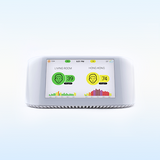Your cart is currently empty.
THE BANE OF INDOOR AIR QUALITY AT RESTAURANT
We all go to restaurants to have a good time with our loved ones, but we end up harming ourselves due to the pollutants released by grills, barbeque and char broilers. These pollutants can be dangerous because they can cause several breathing and lung problems.

Throat irritation;

Chest congestion

Headache

Asthma

Lethargy

Sneezing and wheezing

Respiratory diseases
SOURCES OF INDOOR AIR POLLUTION IN RESTAURANTS
HOW TO TACKLE INDOOR POLLUTION IN RESTAURANTS
SMOKE BUSTER® is known to effectively eliminate indoor pollutants, bad odour, smoke, and grease.
WHAT TO LOOK OUT FOR IN A MACHINE DESIGNED SPECIFICALLY FOR RESTAURANTS
Normal air purifiers can not withstand the demand of restaurants, hookah bars, etc. but SMOKE BUSTER® is equipped with a combination of 8 filters which makes it a perfect air quality management machine for restaurants.
Activated Carbon FilterThis filter works on the principle of adsorption, where gaseous pollutants react chemically with the activated carbon and sticks to the filter. As a result, this filter effectively blocks harmful chemicals and gases released by kitchen equipment.
HEPA FilterA HEPA filter is always used in combination with an activated carbon filter to achieve highly efficient air filtration. The HEPA filter alone is the most efficient filter for people suffering from allergies and asthma. It removes 99.97% of airborne irritants which are as small as 0.3 microns.
UltravioletThe ultraviolet filters are a game-changer. This new technology uses ultraviolet light to incinerate bacteria passing through it. This is beneficial for people suffering from asthma, lung diseases and allergies.
Photo Catalyst FilterThese filters contain titanium dioxide. They purify the air with the help of UV light. When the UV light shines upon the titanium dioxide electrons, the electrons start interacting with water molecules and form hydroxyl radicals. The hydroxyl radicals then attack the larger organic pollutant molecules and turn them into harmless substances like water.
Electrostatic Precipitator (ESP)The ESP filter helps in removing fine particles like dust and smoke. It works by forcing the dirty gas pass through two electrodes where the first electrode is charged to a negative voltage and the second electrode is charged to a positive voltage. As the dust particles move through the first electrode, they pick up a negative charge and then they move towards the positive charged electrode. Since opposite charges attract each other, the dust and soot particles stick to the positive electrode.
INTRODUCING OUR i-CLUSTER TECHNOLOGY WITH MULTISTAGE FILTRATION
SMOKE BUSTER® eliminates indoor pollutants like smoke, smell, gases, carbonmonoxide, etc. and return the air quality to safer levels.

Our Product Range for Customized Solutions for Restaurants
TRION-RESTRO™ - For Restaurant / Barbeque /Smoking Lounges
Rs. 119,990TRION-RESTRO™ to Eliminate Smoke & Smell from Restaurant / Barbeque /Smoking Lounges & Many More Key Features Eliminates Barbeque Smoke and Smell,...
KichPure Ductless Chimney – No Ducting & No Civil Work Required. Purifies Air by Removing Smell, Smoke, Dust, Dangerous Gases, VOCs
Rs. 109,990The Best Ductless Chimney in India: KichPure Are you tired of dealing with a smoky and smelly kitchen every time...
SMOKE BUSTER® - Remove Smoke & Smell From Restaurant / Hotel / Barbeque /Smoking Lounges
Rs. 119,990SMOKE BUSTER® - Effectively Remove Smoke & Smell From Restaurant / Hotel / Barbeque /Smoking Lounges & more Key Features Eliminates...


























